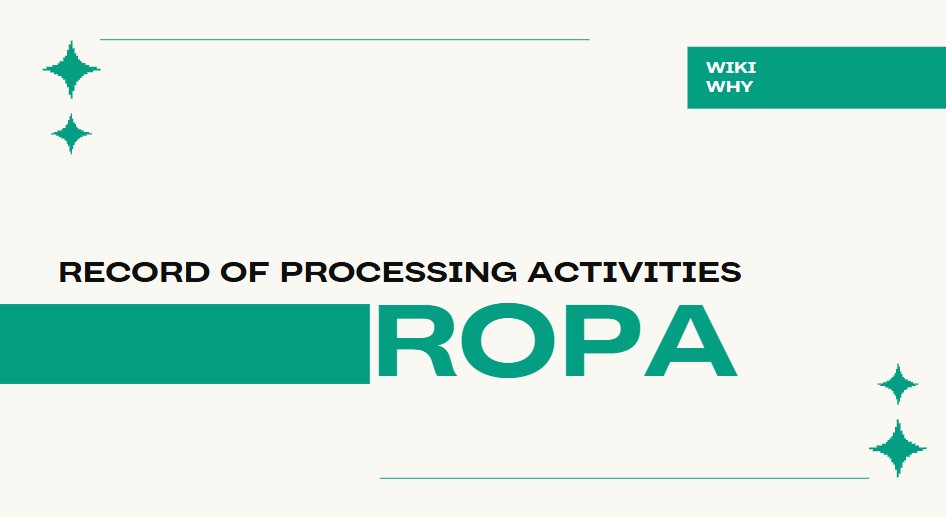Why Is It Important to Have a Comprehensive Record of Processing?
In today’s digital landscape, organisations handle vast amounts of personal data, making compliance with data protection regulations essential.
A comprehensive record of processing activities (ROPA) is a crucial tool for ensuring transparency, accountability, and legal compliance.
Under UK GDPR and other data protection laws, businesses must document how they collect, process, and store personal data. Maintaining detailed processing records helps organisations manage data security risks, support audits, and improve governance.
Without proper documentation, companies risk legal penalties, reputational damage, and operational inefficiencies.
This blog explores why is it important to have a comprehensive Record of Processing, its legal framework, security benefits, and compliance requirements.
What is a Comprehensive Record of Processing Activities (ROPA)?

A Record of Processing Activities (ROPA) is a structured document that details how an organisation collects, processes, and stores personal data.
It is a mandatory requirement under UK GDPR Article 30, ensuring compliance with data protection laws and promoting transparency in data management.
A comprehensive ROPA outlines key processing activities, including the types of personal data collected, such as names, email addresses, and financial information.
It also specifies the purpose of processing, whether for marketing, customer service, or HR management, and defines the legal basis, such as consent, legitimate interest, or contractual necessity.
Additionally, it identifies who has access to the data, including internal teams and third-party processors, along with data retention periods and security measures.
By maintaining accurate and up-to-date records, organisations can manage data risks, demonstrate compliance, and ensure accountability to regulators and stakeholders.
Why is It Important to Have a Comprehensive Record of Processing?
A comprehensive record of processing activities is essential for organizations to ensure they are meeting data protection regulations like the General Data Protection Regulation (GDPR).
Keeping a detailed record is not just a legal requirement, but it also provides numerous benefits to organizations. Below are some key reasons why these records are so important.
Demonstrating Compliance
Under data protection laws such as the GDPR, organizations must keep a record of how they handle personal data.
This record acts as proof that the organization is following legal guidelines when it comes to collecting, processing, and storing personal data.
Without this record, demonstrating compliance with these regulations becomes difficult, especially in the event of an audit or investigation.
Promoting Accountability and Transparency
Having a comprehensive record helps organizations demonstrate their accountability in managing personal data. It shows how data is processed, who is responsible for it, and how it is secured.
This transparency is crucial for building trust with customers and regulators, as it ensures that data is handled responsibly and ethically.
Understanding Data Flows
By maintaining detailed records, organizations can better understand the flow of personal data within their systems. They can map out where data comes from, where it goes, and how it is used.
This knowledge is vital for identifying any potential vulnerabilities, allowing organizations to take action to protect the data and prevent misuse or breaches.
Supporting Data Protection Impact Assessments (DPIAs)
Comprehensive records are crucial for conducting Data Protection Impact Assessments (DPIAs). These assessments are required when data processing activities pose a significant risk to individuals’ privacy.
By having detailed records, organizations can assess the impact of their processing activities, identify potential risks, and put measures in place to mitigate those risks.
Enhancing Data Governance
A thorough record of processing activities contributes to better data governance. It allows organizations to establish clear policies for managing data securely and effectively.
With a clear understanding of their data, businesses can implement best practices for data security, accuracy, and integrity, ensuring that personal information is treated with the highest standard of care.
Facilitating Audits and Inspections
Records of processing activities provide the necessary documentation for internal and external audits. Organizations can use these records to demonstrate their compliance during routine audits or in the case of a data breach investigation.
By having well-maintained records, organizations can quickly identify areas where they may need to improve and take corrective actions before any compliance issues arise.
Managing Risks and Improving Data Quality
Maintaining detailed records helps organizations spot potential risks early, such as the possibility of data breaches, unauthorized access, or misuse.
These records also provide an opportunity to assess the quality and accuracy of the data being processed, ensuring that it remains relevant and up-to-date.
By regularly reviewing these records, businesses can improve data quality and minimize the chances of errors or inconsistencies.
Legal Protection in Case of Breach
In the unfortunate event of a data breach, having a comprehensive record of processing activities can be a crucial asset.
It allows the organization to demonstrate that they have followed all necessary procedures and taken appropriate precautions to protect the data.
In case of legal disputes, these records can be used as evidence to defend against claims, helping to mitigate any legal or financial consequences.
Maintaining a comprehensive record of processing activities ensures legal compliance, accountability, and risk management. It helps protect personal data, improve data quality, and build trust with customers and regulators.
What Legal Framework Requires You to Maintain Processing Records?

Organisations that process personal data must comply with various legal frameworks that require maintaining detailed processing records.
These regulations ensure transparency, accountability, and data protection while minimising risks associated with mishandling personal information.
Key Legal Requirements
UK GDPR (Article 30)
- Requires organisations to maintain a record of their data processing activities.
- Applies to both data controllers and processors handling personal data.
Data Protection Act 2018
- Extends GDPR provisions to fit the UK’s legal system.
- Sets additional requirements for public sector organisations and private businesses.
EU GDPR (for businesses handling EU citizen data)
- Non-EU companies processing EU citizen data must also maintain processing records.
Failure to comply with these frameworks can lead to legal fines, enforcement actions, reputational damage, and customer distrust. Maintaining up-to-date records ensures compliance and protects against regulatory penalties.
Who Needs to Maintain a Record of Processing and Why?
Under UK GDPR, certain organisations are required to maintain a Record of Processing Activities (ROPA), but it is a best practice for all businesses handling personal data. Keeping structured records helps organisations manage data privacy, security, and compliance risks effectively.
Companies with 250 or more employees are legally required to maintain processing records. Businesses handling high-risk data, such as health, financial, or biometric information, must also document their data processing activities.
Additionally, data controllers and processors managing sensitive or large-scale data processing are obligated to keep detailed records. Public authorities and government institutions processing citizen data must also comply with this requirement.
Even smaller organisations benefit from maintaining processing records, as it helps ensure compliance, reduce security risks, and improve operational efficiency.
Keeping accurate records minimises the risk of regulatory investigations, fines, and potential data breaches.
What Information Should Be Included in a Comprehensive Processing Record?

A well-maintained ROPA must contain essential information to ensure legal compliance, transparency, and security. These records provide a clear overview of an organisation’s data processing activities, allowing businesses to identify risks and enforce data protection policies.
Key Elements of a Comprehensive Processing Record
- Categories of personal data collected (e.g., customer details, financial records).
- Purpose of processing (e.g., marketing, HR management, fraud prevention).
- Legal basis for processing (e.g., user consent, contract obligations, legitimate interest).
- Data retention policies outlining how long data is stored before deletion.
- Data sharing practices, including third-party processors and international transfers.
- Security measures used to protect data from unauthorised access or breaches.
By maintaining accurate and up-to-date processing records, businesses can strengthen compliance, reduce data risks, and enhance overall governance.
How Does Keeping a Record of Processing Improve Data Security?
Maintaining detailed processing records plays a crucial role in strengthening data security.
It ensures that organisations follow GDPR-compliant data handling practices, reducing security risks, breaches, and unauthorised access.
By keeping a record of who accesses data, how it is processed, and where it is stored, businesses can:
- Identify vulnerabilities and prevent security threats before they occur.
- Improve breach response strategies, ensuring swift action if a data leak occurs.
- Enhance encryption, user authentication, and access control measures.
- Track high-risk data processing activities, allowing organisations to apply additional security layers.
A well-documented processing record allows businesses to proactively manage security risks, comply with data protection regulations, and maintain customer trust.
Keeping records up to date is essential for ensuring continuous security and legal compliance.
What Are the Risks of Not Maintaining a Proper Record of Processing?
Failing to maintain proper records of processing activities can lead to legal, financial, and reputational risks.
Without accurate documentation, businesses may struggle to prove UK GDPR compliance, risking penalties and regulatory scrutiny. Lack of transparency increases the chances of data breaches, mismanagement, and inefficiencies.
Key risks include legal fines for non-compliance, security vulnerabilities due to overlooked data protection gaps, and regulatory investigations that may lead to audits or enforcement actions.
Additionally, poor data transparency can reduce customer trust and harm brand reputation. Without structured records, businesses may also face operational challenges in managing data, reporting, and compliance.
Maintaining clear and up-to-date records helps organisations stay compliant, enhance security, and build consumer confidence.
Proper documentation also improves data governance, reduces risks, and ensures smoother business operations.
How Can a Record of Processing Help Organisations Demonstrate Compliance?

A well-maintained processing record serves as evidence of compliance with UK GDPR, Data Protection Act 2018, and other privacy regulations.
By documenting data processing activities, organisations can demonstrate transparency, accountability, and adherence to legal obligations.
Ways a Record of Processing Supports Compliance
- Regulatory Audits & Investigations: Authorities may request processing records to assess GDPR compliance. A complete ROPA helps businesses avoid penalties and enforcement actions.
- Data Protection Impact Assessments (DPIAs): Processing records assist organisations in conducting risk assessments for high-risk data activities, ensuring that privacy safeguards are in place.
- Proof of Lawful Data Processing: Organisations can use ROPA to demonstrate a clear legal basis for collecting and using personal data.
- Transparency & Consumer Rights: Keeping detailed records ensures businesses can respond effectively to data subject requests, such as right to access, rectification, and deletion.
- Strengthening Internal Data Governance: A structured processing record helps UK businesses develop robust policies for data retention, security, and compliance management.
A comprehensive ROPA is an essential compliance tool that protects businesses from regulatory risks and improves operational efficiency.
How Often Should You Review and Update Your Processing Records?
A record of processing activities should be reviewed regularly to ensure accuracy and compliance with evolving data protection laws.
Changes in data collection methods, legal requirements, or security policies may require updates to reflect current practices.
It is recommended to review records at least annually to maintain GDPR compliance. Additionally, updates should be made after significant changes, such as new processing activities, technologies, or third-party vendors.
In cases of a data breach or regulatory change, revisions must reflect new security measures or legal obligations.
Keeping records accurate and up to date helps businesses demonstrate compliance, manage data risks effectively, and strengthen data governance.
Conclusion
Maintaining a comprehensive record of processing activities is not just a legal requirement but a critical aspect of data governance.
It ensures compliance with UK GDPR, improves data security, and supports organisational accountability.
By documenting how personal data is collected, processed, and stored, businesses can mitigate risks, prevent data breaches, and demonstrate transparency.
Regularly updating and reviewing processing records is essential for staying compliant and safeguarding consumer trust.
FAQs About Comprehensive Record of Processing
How does a record of processing relate to data minimisation?
A record of processing helps organisations track and limit data collection to what is necessary. It ensures compliance with UK GDPR’s data minimisation principles.
What is the difference between a data inventory and a record of processing?
A data inventory lists all stored data, while a record of processing documents how and why data is processed. Both are crucial for data protection compliance.
Can small businesses be exempt from maintaining processing records?
Small businesses with fewer than 250 employees may be exempt unless they process high-risk data. However, keeping records is recommended for accountability and compliance.
How do processing records help in case of a data breach?
Processing records provide a clear audit trail of data activities, aiding in breach investigations. They help businesses meet reporting obligations under UK GDPR.
What role does a Data Protection Officer (DPO) play in maintaining processing records?
A DPO ensures processing records are accurate, up-to-date, and GDPR-compliant. They oversee data protection strategies and regulatory compliance.
How can organisations ensure accuracy in their records of processing?
Regular audits, automated tracking tools, and internal reviews help maintain accuracy. Updating records after data processing changes ensures compliance.
What happens if a company fails to provide records of processing when requested?
Failure to provide processing records can result in regulatory investigations and heavy fines. It may also damage business credibility and customer trust.







